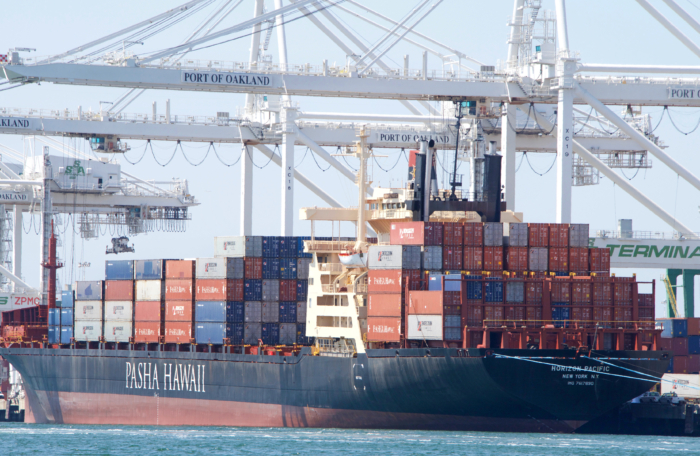After Maui wildfires, The Boston Globe again calls for repeal of the Jones Act
The devastating wildfires on the Hawaiian island Maui have triggered a debate over a protectionist shipping law that’s hindering relief efforts. Even some who typically support government intervention in the economy are speaking out against the century-old law.
The Merchant Marine Act of 1920, or the Jones Act, is a federal law that restricts shipping between U.S. ports to ships that are U.S.-owned, U.S.-built, and U.S.-crewed only. Those restrictions make it harder for mainlanders to help their fellow Americans, such as Puerto Ricans and Hawaiians, after serious disasters. Seeing this, The Boston Globe has called for the act’s full repeal, citing the increased costs of cargo and shipping and the delayed arrival of relief aid.
Relief efforts for Americans who happen to live on islands are hampered by a century-old shipping law that delays the arrival of short-term aid and makes long-term recovery more difficult and costly…. One not so small suggestion, Mr. President: Ask Congress to repeal the Jones Act, which continues to be a hindrance every time disaster strikes islands.
By connecting the Maui tragedy to the Jones Act, The Boston Globe has again put itself on the side of long overdue free-market reform in this policy area.
Foreign shipbuilding long ago outstripped that being done in the US — and it’s far less expensive. A recently constructed container ship built to serve Hawaii from the mainland carried a price tag of more than $225 million, according to the CATO Institute, compared to $41 million for a similar South Korean-built ship. Operating costs of American vessels, that same study noted, are roughly three times that of their international counterparts.
Thus, the protectionist Jones Act simply adds to the cost of everything carried on those US vessels. A 2020 study by the Grassroot Institute of Hawaii estimated that the Jones Act cost the average Hawaiian family some $1,800 a year and cost the islands overall some $1.2 billion a year. So, yes, it will constitute a substantial burden on Maui’s recovery.
After Hurricane Fiona struck Puerto Rico last September, The Globe pointed out that the Jones Act hindered relief efforts and subsequently called for its repeal.
Once again, Puerto Ricans are paying the price for an antiquated shipping law that makes food and other goods more expensive on the island. The law is inexcusable in ordinary times — and downright scandalous now, when the island is reeling from yet another natural disaster.
One hundred years of protectionism in U.S. shipping has artificially inflated the price of goods for all Americans, as well as the cost of shipping itself. And by shielding U.S. shipbuilders from foreign competition, the Jones Act has stunted U.S. shipbuilding while the rest of the world has thrived in a competitive global market.
According to the U.S. Department of Transportation, the United States has only 99 ships that are Jones Act-compliant for domestic transports. Meanwhile, there are more than 60,000 commercial vessels in the ocean around the world.
Whether it be wildfires in Hawaii or hurricanes in Puerto Rico, this anti-free-market law burdens the shipping of crucial aid to U.S. islands and their people. And while the Jones Act’s ramifications are on full display when places like Hawaii and Puerto Rico need emergency relief, the adverse effects of the federal law reach New Hampshire consumers as well.
High energy costs have been hurting Granite Staters for years, and the Jones Act plays a supporting role. New England’s limited access to pipelines and minimal pipeline capacity make its entire energy grid more dependent upon shipping oil and natural gas from other states when demand heightens during the winter months.
For New Hampshire to access the bulk of U.S.-produced oil and gas, though, would involve transporting fuel on tankers from domestic producers like Texas or Pennsylvania.
There’s just one problem: The United States doesn’t have any liquid natural gas (LNG) tankers that are Jones Act-compliant to ship oil and gas from Texas or Pennsylvania to New England. And foreign-made tankers are prohibited from shipping oil and gas between U.S. states because of the Jones Act. The results include higher energy costs for Granite Staters, a greater reliance on imported fuel, and higher odds that New Hampshire suffers blackouts during periods of peak energy demand.
The best option for Granite State consumers would be to allow any tanker to make deliveries directly between U.S. ports. (New England governors have repeatedly sought Jones Act waivers to allow that.)
This would help open New Hampshire’s energy grid to domestic fuel, doing so at a lower price than imports. In fact, a J.P. Morgan analysis finds that merely suspending the Jones Act could save consumers 10 cents per gallon of gas just by allowing more inexpensive foreign ships to transport domestic gas between U.S. ports.
The Jones Act even contributes to New England’s traffic troubles. Because the law effectively prevents transporting domestic cargo over coastal waters, the freight that otherwise would be shipped is instead hauled by truckers, further clogging the interstates surrounding New York City and Boston.
It shouldn’t take a natural disaster for the Jones Act to face this kind of scrutiny. But The Globe deserves credit for taking these periodic opportunities to educate the public on the law’s harmful effects and argue forcefully for its repeal.



